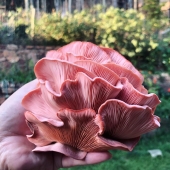





Some places need to be wild





 6
6




List of Bryant RedHawk's Epic Soil Series Threads We love visitors, that's why we live in a secluded cabin deep in the woods. "Buzzard's Roost (Asnikiye Heca) Farm." Promoting permaculture to save our planet.














Some places need to be wild










 1
1




Some places need to be wild












 5
5




List of Bryant RedHawk's Epic Soil Series Threads We love visitors, that's why we live in a secluded cabin deep in the woods. "Buzzard's Roost (Asnikiye Heca) Farm." Promoting permaculture to save our planet.
 3
3




Eric Hanson wrote:So what does break down locust then?
I mean is the world doomed to being neck deep in locust trunks & branches? Surely something eventually breaks the stuff down doesn’t it?
Eric
A build too cool to miss:Mike's GreenhouseA great example:Joseph's Garden
All the soil info you'll ever need:
Redhawk's excellent soil-building series









“All good things are wild, and free.” Henry David Thoreau












 1
1




List of Bryant RedHawk's Epic Soil Series Threads We love visitors, that's why we live in a secluded cabin deep in the woods. "Buzzard's Roost (Asnikiye Heca) Farm." Promoting permaculture to save our planet.










 2
2




Some places need to be wild




Greetings from Brambly Ridge










 1
1




Some places need to be wild
 1
1




The holy trinity of wholesomeness: Fred Rogers - be kind to others; Steve Irwin - be kind to animals; Bob Ross - be kind to yourself














Some places need to be wild

| I agree. Here's the link: http://stoves2.com |


